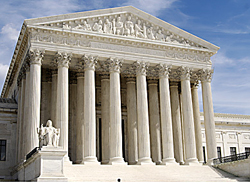On June 27, the Supreme Court decided to accept a 2005 Washington D.C. warrantless tracking case that illustrates how confusing GPS satellite positioning and the new technologies that follow, sense and link us are to judges and public alike. The case, United States v. Jones, will probably be heard during the October 2011 term.
On June 27, the Supreme Court decided to accept a 2005 Washington D.C. warrantless tracking case that illustrates how confusing GPS satellite positioning and the new technologies that follow, sense and link us are to judges and public alike. The case, United States v. Jones, will probably be heard during the October 2011 term.
The U.S. Solicitor General’s office had asked the Court to take up the case on April 15, to decide whether prolonged police surveillance using GNSS-aided tracking of a suspect requires a warrant.
The 2005 case to be reviewed concerns Antoine Jones, a Washington D.C. nightclub owner and suspected drug dealer. Metropolitan police obtained a warrant and attached a GPS-aided tracking device to his vehicle. After the warrant expired, the police again attached a device and eventually followed Jones to a "stash house." This long term surveillance resulted in his arrest, trial and conviction.
In 2010, a three-judge panel from the U.S. Court of Appeals for the Tenth Circuit disagreed with that decision and the method by which police had gathered evidence against Jones.
The U.S. Department of Justice asked the appeals court to reconsider, and, last November, those judges voted against reopening the case.
Other appeals court cases across the country have shown the same back-and-forth disagreement, decision and reversal, on the thorny issue of how to handle personal privacy, the rights of suspects and the growing ability to follow everyone, everywhere, all of the time.
Related stories:
(April 16, 2011 Inside GNSS) U.S. Department of Justice Seek Court Review of GPS Surveillance
(December 4, 2010 Inside GNSS) United States Appeals Courts Disagree on GPS Technology and Privacy Rights






